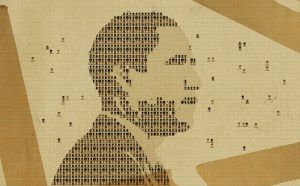Ezra Klein in Vox:
 In 2008, Barack Obama held up change as a beacon, attaching to it another word, a word that channeled everything his young and diverse coalition saw in his rise and their newfound political power: hope. An America that would elect a black man president was an America in which a future was being written that would read thrillingly different from our past. In 2016, Donald Trump wielded that same sense of change as a threat; he was the revanchist voice of those who yearned to make America the way it was before, to make it great again. That was the impulse that connected the wall to keep Mexicans out, the ban to keep Muslims away, the birtherism meant to prove Obama couldn’t possibly be a legitimate president. An America that would elect Donald Trump president was an America in which a future was being written that could read thrillingly similar to our past. This is the core cleavage of our politics, and it reflects the fundamental reality of our era: America is changing, and fast. According to the Census Bureau, 2013 marked the first yearthat a majority of US infants under the age of 1 were nonwhite. The announcement, made during the second term of the nation’s first African-American president, was not a surprise. Demographers had been predicting such a tipping point for years, and they foresaw more to come.
In 2008, Barack Obama held up change as a beacon, attaching to it another word, a word that channeled everything his young and diverse coalition saw in his rise and their newfound political power: hope. An America that would elect a black man president was an America in which a future was being written that would read thrillingly different from our past. In 2016, Donald Trump wielded that same sense of change as a threat; he was the revanchist voice of those who yearned to make America the way it was before, to make it great again. That was the impulse that connected the wall to keep Mexicans out, the ban to keep Muslims away, the birtherism meant to prove Obama couldn’t possibly be a legitimate president. An America that would elect Donald Trump president was an America in which a future was being written that could read thrillingly similar to our past. This is the core cleavage of our politics, and it reflects the fundamental reality of our era: America is changing, and fast. According to the Census Bureau, 2013 marked the first yearthat a majority of US infants under the age of 1 were nonwhite. The announcement, made during the second term of the nation’s first African-American president, was not a surprise. Demographers had been predicting such a tipping point for years, and they foresaw more to come.
White voters who feel they are losing a historical hold on power are reacting to something real. For the bulk of American history, you couldn’t win the presidency without winning a majority — usually an overwhelming majority — of the white vote. Though this changed before Obama (Bill Clinton won slightly less of the white vote than his Republican challengers), the election of an African-American president leading a young, multiracial coalition made the transition stark and threatening. This is the crucial context for Trump’s rise, and it’s why Tesler has little patience for those who treat Trump as an invader in the Republican Party. In a field of Republicans who were trying to change the party to appeal to a rising Hispanic electorate, Trump was alone in speaking to Republican voters who didn’t want the party to remake itself, who wanted to be told that a wall could be built and things could go back to the way they were. “Trump met the party where it was rather than trying to change it,“ Tesler says. “He was hunting where the ducks were.”
More here. (Note: Thanks to Jehanzeb Kayani)
